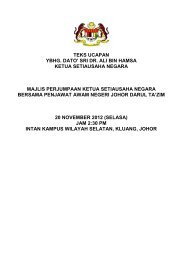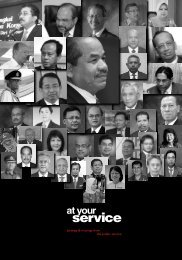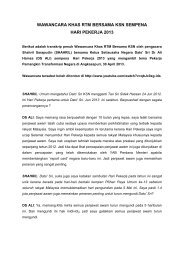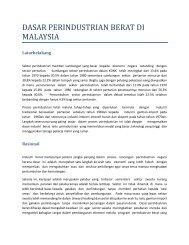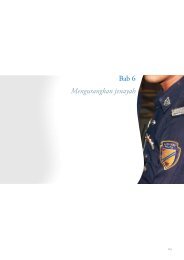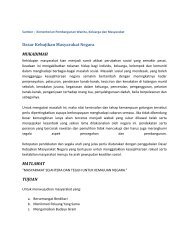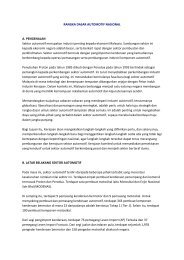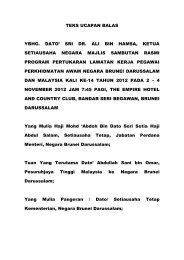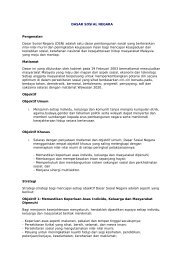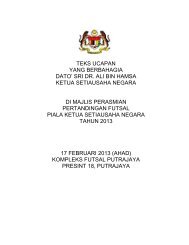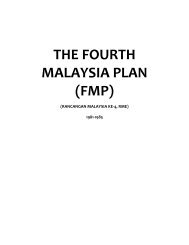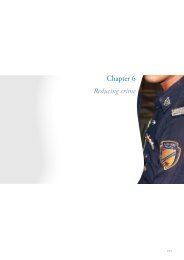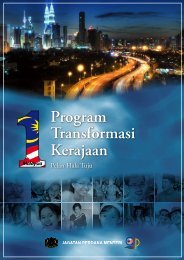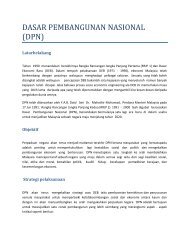GTP 2.0 - Prime Minister's Office of Malaysia
GTP 2.0 - Prime Minister's Office of Malaysia
GTP 2.0 - Prime Minister's Office of Malaysia
You also want an ePaper? Increase the reach of your titles
YUMPU automatically turns print PDFs into web optimized ePapers that Google loves.
dElIvERING OuTCOMES<br />
ENHaNCING COMMuNICaTIONS<br />
ChamPIoN:<br />
mINIstRy oF INFoRmatIoN, CommuNICatIoNs aND CultuRE (moICC)<br />
An important component <strong>of</strong> the MoICC’s<br />
portfolio is to ensure the continued improvement<br />
<strong>of</strong> communication services in <strong>Malaysia</strong>, and this<br />
has been deemed an MKRA. In delivering on this<br />
commitment, MoICC has implemented a number<br />
<strong>of</strong> programmes to ensure that the standard <strong>of</strong><br />
wireless communications in the country meets<br />
quality benchmarks. The Mandatory Standard for<br />
<strong>of</strong> Service (for public cellular service)<br />
is one such programme.<br />
Based on the requirements <strong>of</strong> this benchmark,<br />
cellular providers must report the number <strong>of</strong><br />
dropped calls experienced by their users, and<br />
that and that number <strong>of</strong> dropped calls must<br />
not exceed a 5% threshold. The provision <strong>of</strong><br />
dropped call data provides the MoICC with a<br />
baseline to start from, which is further acted<br />
upon by a task force involving the <strong>Malaysia</strong>n<br />
Communications and Multimedia Commission<br />
(MCMC) and providers.<br />
Beginning in 2012, this programme was<br />
widened to provide nationwide dropped-call<br />
Enhancing wireless<br />
communications and<br />
broadband access<br />
statistics twice a year. The first measurement,<br />
completed in June 2012, showed that 1.3%<br />
<strong>of</strong> total calls were dropped. At the same time,<br />
the MoICC has also stepped up efforts to expand<br />
internet broadband penetration throughout the<br />
country via a variety <strong>of</strong> initiatives. By the end <strong>of</strong><br />
October 2012, broadband penetration reached<br />
64% <strong>of</strong> the country’s population from 10.9<br />
percent in 2006.<br />
This significant increase in penetration<br />
is a direct result <strong>of</strong> the National Broadband<br />
Initiative launched in 2009, specifically through<br />
the establishment <strong>of</strong> Rakyat Internet Centres<br />
(Pusat Internet Rakyat) and the distribution <strong>of</strong><br />
1<strong>Malaysia</strong> netbooks to families with incomes<br />
<strong>of</strong> less than RM3,000.<br />
Moreover, 2011 saw the introduction <strong>of</strong><br />
the Wireless Village programme to selected<br />
villages in rural areas, which were provided<br />
with internet access. Over 1,400 villages were<br />
established and some 349,400 netbooks were<br />
distributed in that year alone. These initiatives<br />
were continued in 2012, which also saw the<br />
creation <strong>of</strong> Desa Internet Centres.<br />
MoICC expects to enhance penetration<br />
in 2013 by establishing a further 689 wireless<br />
villages, 162 Rakyat Internet Centres and<br />
the construction <strong>of</strong> an additional 336<br />
communication towers.<br />
The Government firmly believes that one<br />
<strong>of</strong> the key enablers <strong>of</strong> a high-income nation is<br />
nation is a population firmly in touch with the<br />
technological advancements <strong>of</strong> the day.<br />
By increasing broadband penetration, particularly<br />
to rural rakyat who may otherwise not be able<br />
to afford the utility, the <strong>Malaysia</strong>n Government<br />
is delivering on its commitment to inclusiveness,<br />
ensuring that all rakyat receive similar<br />
opportunities regardless <strong>of</strong> background.<br />
dElIvERING OuTCOMES<br />
PROTECTING INTEllECTual<br />
PROPERTy RIGHTS (IPR)<br />
ChamPIoN:<br />
mINIstRy oF sCIENCE, tEChNoloGy aND INNovatIoN (mostI)<br />
As the lead ministry formulating policies in the<br />
areas <strong>of</strong> science, technology and innovation, MOSTI<br />
is also directly responsible for formulating policies<br />
supporting and sustaining growth in these areas. In<br />
2009, the Cabinet approved the Intellectual Property<br />
Commercialisation Policy for research and development<br />
(R&D) projects funded by the Government <strong>of</strong> <strong>Malaysia</strong>.<br />
Enhancing innovation<br />
in research through<br />
better IPR protection<br />
This policy makes a formal<br />
recognition <strong>of</strong> the importance<br />
<strong>of</strong> intellectual assets in driving<br />
the growth <strong>of</strong> a knowledge-based<br />
economy, and regulates and<br />
promotes the commercial uses <strong>of</strong><br />
research outputs <strong>of</strong> R&D projects<br />
funded by the Government.<br />
This policy ensures that all<br />
royalties and commercial fees<br />
received from activities such as<br />
technology transfer and licensing<br />
are governed in accordance with<br />
the terms and conditions <strong>of</strong> the<br />
research agreement. The policy<br />
also ensures that proceeds are<br />
chanelled to the right funds such as<br />
MOSTI’s Science Fund, Techno Fund<br />
and Inno Fund, or other agencies<br />
under MOSTI such<br />
as MTDC and MDEC.<br />
This policy covers a number <strong>of</strong> IPR<br />
categories including:<br />
• PATENTS<br />
• INDUSTRIAL DESIGNS<br />
• COPYRIGHTS<br />
• TRADE/SERVICE MARKS<br />
186 Government transformation Programme—Annual Report 2012 Chapter ten 187<br />
Government transformation Programme—Annual Report 2012 Chapter ten



